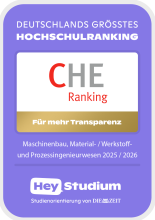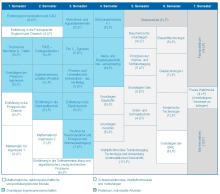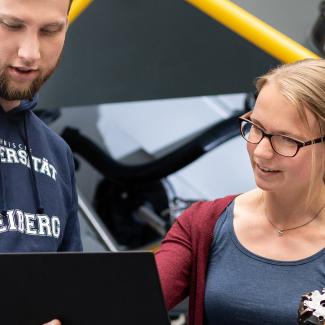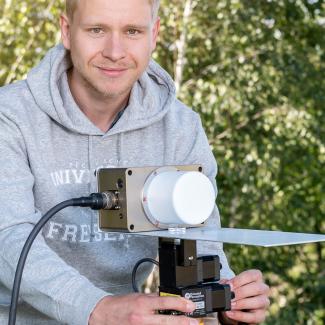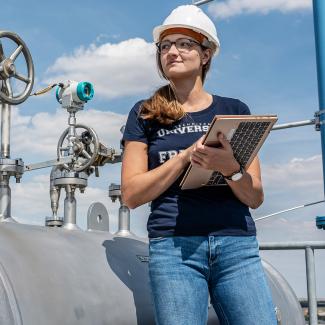Technologie und Anwendung nichtmetallischer Werkstoffe
The Technology and Application of Non-Metallic Materials (TANW for short) is part of the degree programme Engineering and deals with the production, characterisation and design of innovative non-metallic inorganic materials, characterisation and design of innovative non-metallic inorganic materials - these are ceramics, glass and building materials as well as composites and material composites from the combination of the three material groups. You will learn about the properties of the materials, their areas of application and the manufacturing processes. With an understanding of the interrelationships and functionalities, you will then be ideally equipped for a job in the basic materials industry. With the subsequent Master's degree, you can then further qualify for a responsible job to accompany processes, technologies and materials into a sustainable, climate-neutral future.
Ceramics, glass and building materials are essential for our modern lives and, in addition to inexpensive mass-produced goods for everyday life - who doesn't have a toilet bowl? - true high-tech products:
- Filter ceramics, for example for exhaust gas purification
- ultra-hard ceramics - harder than diamond
- extremely heat-resistant ceramics for refractory applications
- Bridges with walkable glass
- Photonic glass fibres enable micro-invasive operations
- Bioglass is resorbed by the body and enables new bone formation, which replaces the implant
- Cover glass protects photovoltaic cells from wind, weather weather and mechanical damage
- Glass fibres reinforce the rotor blades of wind turbines
- Self-compacting concrete enables earthquake-proof, durable and sustainable buildings
- ultra-high-strength concrete is used to build extremely resilient structures
- Binding agents not only give moulds stability, but also enable functional materials through skilful formulations, including houses from the 3D printer
These examples are just a fraction of the variety of ceramics, glass and building materials.
These materials have one disadvantage: They are produced at extremely high temperatures. The energy required for this and the production itself release a lot of climate-damaging CO₂ - for the time being. We are conducting research into climate neutrality and sustainable processes in a closed cycle. Become part of the change and study TANW so that you can make a difference in your career and transfer research into practice!
Your Bachelor's degree programme in Engineering is divided into a very comprehensive basic education in natural sciences and engineering in the first four semesters and a fundamental part on ceramics, glass and building materials technology in the following semesters. To a limited extent (the Bachelor's degree course only lasts 7 semesters), you can develop according to your interests by making choices, e.g. from the module catalogue or the topics for your student research project and Bachelor's thesis. A major advantage of engineering is that you only have to make a final decision on a specialisation after the basic training, as TANW is one of a total of six sub-degree programmes. So be sure to take a look at the profile of our Bachelor's degree programme in Engineering!
For the sake of honesty, it must be said that there is hardly any time for in-depth or special content on ceramics, glass or building materials technology in the 7-semester Bachelor's degree programme. The TANW Bachelor's programme therefore hardly goes beyond the basics. Of course, you can also acquire in-depth and specialised knowledge, taking your interests more into account, in a subsequent Master's degree programme in Ceramics, Glass and Building Materials Technology (KGB for short), which is also offered at TUBAF.
If you are now wondering whether a continuous 10-semester diploma programme KGB or a 7-semester Bachelor Engineering-TANW followed by a 3-semester Master KGB is more suitable for you, then simply give us a call or visit us at the Campus Day. We will be happy to present the content to you in detail.
What else needs to be said:
When we developed the Bachelor's degree programme in Engineering together with dedicated students at our faculty in 2020, the following was very important to us in terms of studyability:
- relatively few exams per examination period: you don't have to rush from exam to exam! You have the time and opportunity to really get to grips with the material and learn it for your long-term memory.
- Early contact (from the second semester) with modules with engineering applications and reference to current research work: This keeps your motivation for engineering studies at a high level even during the otherwise long "dry spell" of basic science and engineering training (first four semesters).
- Individual options by choosing compulsory elective modules from a specified module catalogue and by choosing free elective modules: you can develop flexibly according to your interests and have the opportunity to think outside the box.
- You will gain practical and research experience in the basic internship, during two specialist excursions, a student research project, a 14-week specialist internship and a Bachelor's thesis.
- An education in the specialised language of English and introductory business administration will also provide you with the basis for success in an international environment.
We, the study committee, are convinced that with the Bachelor's degree programme in Engineering we are providing a flexible yet rigorous undergraduate degree programme that will prepare you in an excellent way for future job profiles in further engineering degree programmes in industry, business and science, taking your interests into account.
We will be happy to support you. If you have any questions about the programme, please call us or send us an email.
- Faculty
-
Faculty of Mechanical, Process and Energy Engineering (Faculty 4)
- Degree
-
Bachelor of Science (B. Sc.)
- Standard period of study
-
7 Semester
- Part-time possible
-
No
- Start of studies
-
Winter semesterSummer semester
- Admission requirement
-
Abitur or subject-specific higher education entrance qualification or an entrance qualification recognised as equivalent
Language requirement
- Application: with at least B1 level German
- Admission to the degree program: with C1 level German (e.g. DSH-2)
- language courses and DSH exam at TUBAF
- Prep Courses (Studienkolleg)
- Course language
-
German
On completion of the "Technology and Application of Non-Metallic Materials" sub-degree programme, you will be able to master the fundamental processes in the production of non-metallic-inorganic materials. You will then be able to apply this knowledge in a wide range of areas, e.g. as a production engineer in the manufacturing industry, in quality assurance or materials testing, but also in research and development of new innovative materials, processes and production systems. There are career opportunities for you in the following industries:
- Ceramics and refractory industry, building materials and glass industry
- Public service and research
- Renewable energies and electronics
- Medical technology and metallurgy
- Automotive and aviation industry
The basic materials industry of ceramics, glass and building materials is active regionally in Saxony. Companies often belong to global corporations that enable work in Europe and around the world. You are free to choose. We will prepare you for it. Incidentally, you will be a sought-after specialist once you have successfully completed the programme!
Basic understanding of maths and science subjects at school. Interest and enthusiasm for new things, perseverance and a little self-discipline and ambition are important.
A 6-week basic internship is required for this degree programme (30 working days). Completion or partial completion before the degree programme (after the Abitur) is recommended. The internship can also be completed during the degree programme. Requirements for the basic internship can be found in the adjacent download. Dr Dög will be happy to answer any questions you may have (see the box on the right "Specialist advice").
Why study TANMW at TUBAF?
- Because the needs of the students were strongly taken into account when creating the degree programme (manageable number of examinations, stringent study options, elective options, application and research relevance at an early stage of the degree programme)
- Because you value short distances and personal contact with the lecturers
- Because you would like to benefit from the lecturers' international contacts and be supported in organising a semester abroad or your Bachelor's thesis at an international research institution (we are happy to arrange this)
- . (we will be happy to put you in touch)
- Because you would like to work as a paid research assistant on current research projects and thus gain insights into current research (we need your support for our research projects)
- Because TUBAF has excellent contacts with funding organisations that support our students in the form of grants:inside that support our students in the form of scholarships (scholarship chances are quite high!)
- Because we prioritise our students, precisely because we are a small but very research-intensive university. Our graduates are also our doctoral students of tomorrow, with whom we like to research the challenges of the future together!
- Because life (including housing) in Freiberg is not as overpriced as in some other university cities
Suitable further/similar degree programmes
Introduction to the degree programme
The Bachelor's degree programme in Engineering with six sub-degree programmes
Fascination with technology - study engineering in Freiberg
Rankings
